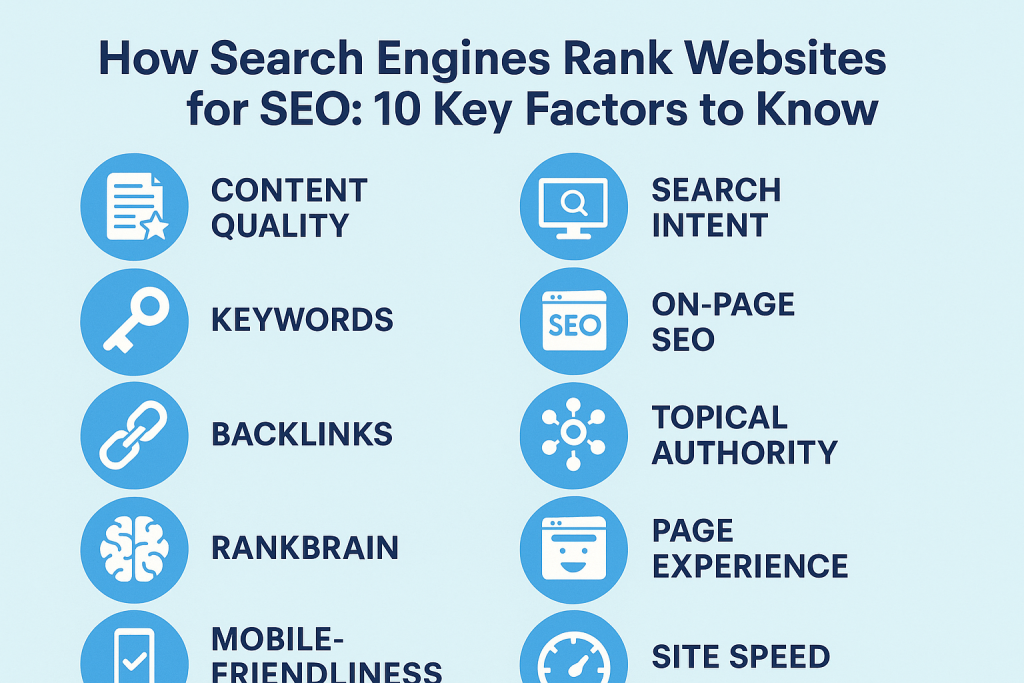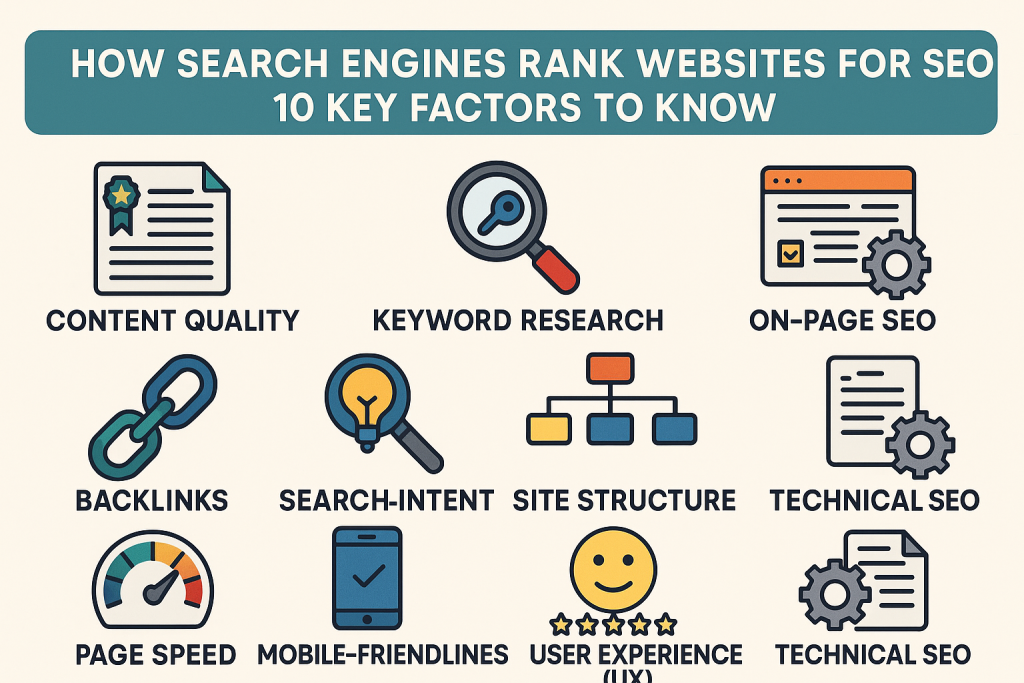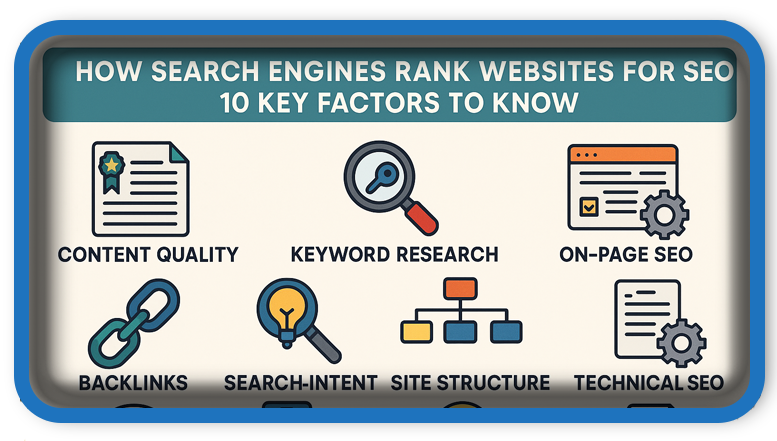⏲️ Estimated reading time: 5 min
How Search Engines Rank Websites for SEO: 10 Key Factors to Know. Search engines rank websites using complex algorithms that consider factors like content quality, backlinks, keywords, and user experience. Learn the top 10 SEO ranking factors that can improve your website’s visibility and authority.
How Search Engines Rank Websites for SEO: 10 Key Factors to Know
Understanding how search engines like Google rank websites is essential for anyone looking to boost their online presence. Search Engine Optimization (SEO) involves a blend of strategies designed to enhance your site’s relevance and authority in response to specific user queries. Below, we explore the top 10 key factors that influence search engine rankings and how you can leverage them to improve your SEO strategy.
1. Content Quality
High-quality, original, and valuable content is the cornerstone of good SEO. Search engines prioritize pages that offer in-depth information that satisfies user intent. Thin or duplicated content can harm your rankings, while comprehensive, engaging, and well-written content increases trust and relevance.
Tips:
- Focus on solving the reader’s problem.
- Use clear, easy-to-understand language.
- Include multimedia like images, videos, and infographics for better engagement.
2. Keywords
Keywords help search engines understand the topic of your page. Incorporating relevant keywords naturally in titles, headers, meta tags, and throughout the content is essential.
Tips:
- Use tools like Google Keyword Planner or Ubersuggest to find relevant keywords.
- Don’t stuff your page with keywords use them naturally.
- Optimize for long-tail keywords for better targeting and lower competition.
3. Backlinks
Backlinks act as endorsements from other websites. The more reputable websites that link to yours, the more trustworthy your content appears to search engines.
Tips:
- Aim for backlinks from authoritative websites.
- Create share-worthy content that naturally attracts links.
- Consider guest posting and collaborations for exposure.
4. User Experience (UX)
Search engines reward sites that offer a smooth and engaging experience. Factors such as fast loading speed, mobile responsiveness, easy navigation, and low bounce rates indicate a user-friendly site.
Tips:
- Use responsive design for mobile compatibility.
- Optimize image sizes and leverage caching for faster loading.
- Structure content with clear headings and bullet points.
5. Technical SEO
Behind the scenes, technical elements of your site play a vital role in SEO. Search engine bots rely on these elements to crawl and index your content efficiently.
Tips:
- Ensure clean and crawlable code (HTML/CSS/JavaScript).
- Create and submit an XML sitemap.
- Use
robots.txtto guide search engine crawlers.
6. Social Signals
While not a direct ranking factor, social signals from platforms like Facebook, Twitter, and LinkedIn can drive traffic and increase brand awareness.
Tips:
- Share your content regularly on social media.
- Encourage followers to engage with your posts.
- Add social sharing buttons to your blog.

7. Domain Authority
Domain Authority (DA) is a metric developed by Moz that predicts how well a website will rank on search engines. Older domains with a history of quality content tend to have higher authority.
Tips:
- Maintain consistent publishing of valuable content.
- Avoid black-hat SEO techniques.
- Secure high-quality inbound links.
8. Local SEO
For businesses with a physical presence or targeting a specific geographic area, local SEO is vital. Optimizing your site for local search can bring in more qualified leads.
Tips:
- Claim and optimize your Google My Business profile.
- Get listed on local directories and citation sites.
- Encourage customer reviews and respond promptly.
9. User Engagement Metrics
Search engines monitor how users interact with your site. Metrics like time on page, click-through rate (CTR), bounce rate, and pages per session provide insights into user behavior.
Tips:
- Create compelling meta descriptions to boost CTR.
- Use internal linking to guide users through your site.
- Add engaging elements like quizzes or polls.
10. Freshness of Content
Keeping your content up to date signals to search engines that your site is active and relevant. This is particularly important for time-sensitive or evergreen topics.
Tips:
- Regularly update blog posts and pages.
- Add new content based on trending topics in your niche.
- Repurpose older content with new data and visuals.
✳️ Optimization Is an Ongoing Process
Search engine algorithms are constantly evolving, making SEO a continuous process. Staying up to date with the latest best practices, monitoring your site’s performance, and refining your strategy regularly is key to long-term success.
Whether you’re a blogger, entrepreneur, or eCommerce store owner, implementing these 10 SEO ranking factors can significantly improve your visibility, traffic, and conversion rates.

🔔 For more tutorials like this, consider subscribing to our blog.
📩 Do you have questions or suggestions? Leave a comment or contact us!
🏷️ Tags: SEO, search engine ranking, backlinks, content quality, keywords, domain authority, technical SEO, user experience, Google ranking, local SEO
📢 Hashtags: #SEO #SearchEngineOptimization #Backlinks #ContentMarketing #TechnicalSEO #GoogleRanking #DigitalMarketing #WebsiteTraffic #OnlineSuccess #SEOTips
Final Thoughts
Understanding how search engines rank websites empowers you to make informed decisions about your digital strategy. From content creation to technical fixes and user engagement, every detail matters. By aligning your efforts with these ranking factors, you’ll build a stronger online presence and outperform your competition.
Only logged-in users can submit reports.
Discover more from HelpZone
Subscribe to get the latest posts sent to your email.

